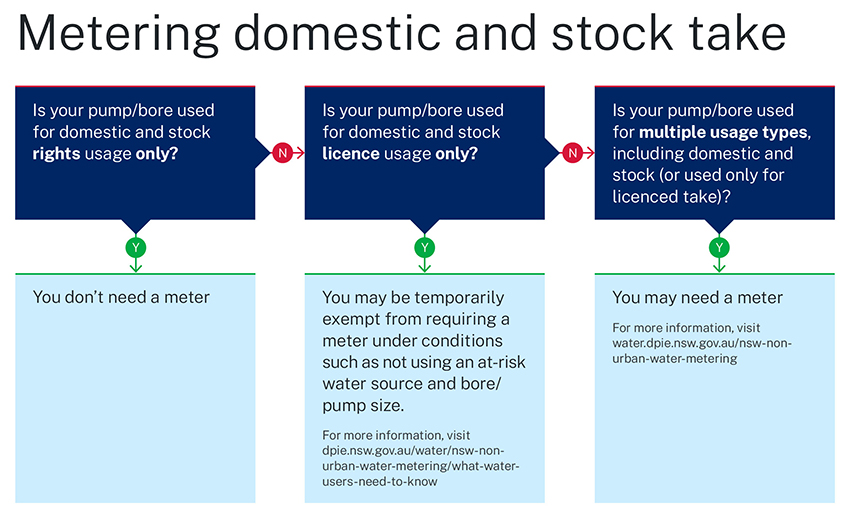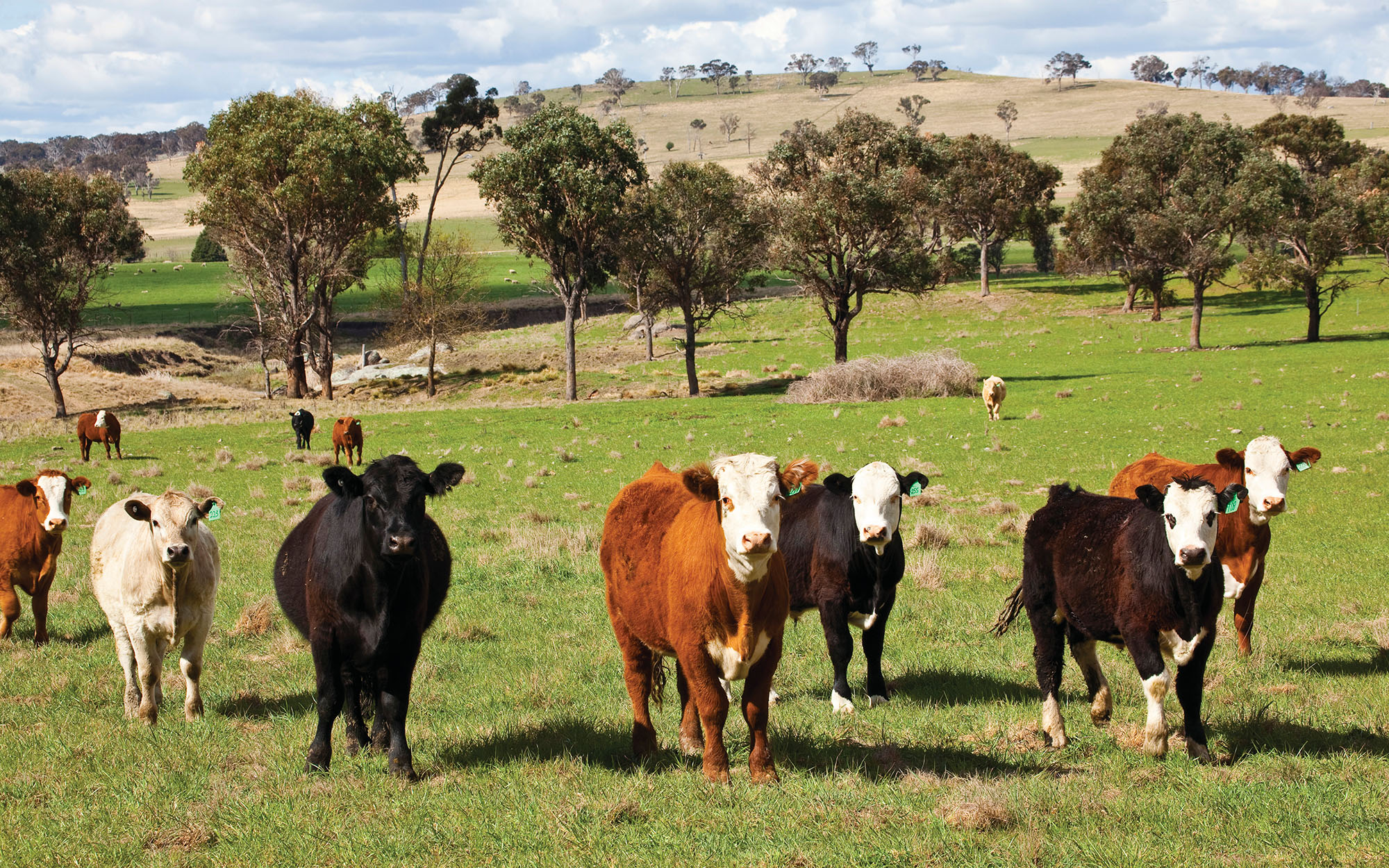Overview of domestic and stock rights
What are domestic and stock rights?
Domestic and stock rights are a right for landholders on land with river, lake or estuary frontage, or above an aquifer, to take and use water for domestic consumption and stock watering without certain authorisations1.
These rights are a type of basic landholder right.
Why do domestic and stock rights exist?
The Water Management Act 2000 established domestic and stock rights – a type of basic landholder right – to replace riparian rights that existed under the Water Act 1912. The rights are aimed at providing a quantity of water for domestic and stock use without requiring licensing or approvals in most circumstances.
Water supply work approvals are still required to construct a groundwater bore for domestic and stock rights purposes and to construct a dam to hold water taken under domestic and stock rights.
Does the landholder have to be the owner of the land?
No. For domestic and stock rights to apply, the landholder can be the owner of the land or a lawful occupier2. A lawful occupier includes a person with a lease, easement or Crown land licence.
When might I need a water supply work approval to use my domestic and stock right?
You need a water supply work approval to construct a groundwater bore, including to take groundwater under domestic and stock rights.
A water supply work approval for a bore may authorise:
- the construction and use of the bore for any purpose by the landholder, subject to any other relevant authorisations, OR
- the construction of the bore under domestic and stock rights only - in this case the water taken can only be used by the landholder for domestic consumption and stock watering.
You also need a water supply work approval to construct a dam, including to store water taken under domestic and stock rights, unless the dam is constructed under a harvestable right and is within the allowable maximum capacity.
You do not need a water supply work approval for pumps, pipes, troughs or tanks used to take or store water from a river under domestic and stock rights.
A water access licence or water use approval is not required to take or use water under domestic and stock rights3.
Information on water supply work approvals, including how to apply, is available on the WaterNSW approvals webpage.
How do I find out if my water supply work approval is for domestic and stock rights only?
Use your approval number to check the record of your approval on the NSW Water Register.
If the record says your water supply work approval is for ‘basic rights’, then the approval is for domestic and stock rights only (unless you are also eligible for Native Title rights).
If I do not have domestic and stock rights, can I still take water for domestic and stock purposes?
Yes, but you will need to apply for a domestic and stock water access licence.
You may also require a water supply work approval, for example if you intend to construct and use a bore to access groundwater for domestic and stock licence purposes.
More information on water access licences, including domestic and stock licences, is available on the WaterNSW water access licences webpage (see Categories of a water access licence).
What can water taken under domestic and stock rights be used for?
Water taken under domestic and stock rights and domestic and stock licences can only be used for domestic consumption and stock watering by the landholder.
Domestic consumption and stock watering are defined in Section 52 of the Water Management Act 2000 and further explained in the Domestic and stock rights FAQs (PDF, 1228.5 KB)
What is domestic consumption?
Domestic consumption means the use of water for normal household purposes in and around a domestic premises situated on the land where the water is taken. This includes water for drinking, laundry, or watering a non-commercial garden connected to the household.
What is stock watering?
Stock watering is providing water to stock animals being raised on the land for drinking, and to maintain health and hygiene.
Stock watering in this context does not mean:
- providing water to stock animals in an intensive commercial operation, where the animals are housed or kept in feedlots or other building types all or most of the time, or
- irrigating feed for stock animals.
What happens if the water sharing plan in my area changes and the conditions on my water supply work approval change?
You will be notified of any changes to the conditions of your water supply work approval.
Changes are most likely to occur when the water sharing plan is remade (every 10 years) or amended.
All new conditions apply immediately, but only in relation to future activities. There is no impact on past activities as new conditions do not apply retrospectively.
Future activities include:
- bore construction, such as requirements for headworks to enable the control of water flow, requirements if contaminated water is encountered, and requirements to submit information using a “Form A”
- decommissioning bores which are no longer being used to ensure they are safe and contaminated water cannot enter the bore.
Metering
What are the water meter requirements under the new non-urban water metering rules?
The new non-urban water metering rules require most water supply works, including water bores and pumps, to have metering equipment.
Some exemptions apply for low-risk works. This includes exemption for bores used only for domestic and stock rights purposes, and a temporary exemption for bores and pumps used only for domestic and stock licence purposes.
Do I need a water meter on a bore used only for domestic and stock rights purposes?
No, a water meter is not required for a water bore used only for domestic and stock rights. If the bore is also used for other types of licensed water take, a meter may be required under the non-urban metering rules.
Refer to the diagram at the bottom of the page.
Do I need a water meter on a bore or pump used only for domestic and stock water access licence purposes?
The NSW Government has established a temporary exemption under the non-urban metering rules so that small pumps or bores taking water for domestic and stock licensed purposes only are not required to be metered.
If all the statements in the checklist below apply to your pump or bore, it is exempt from the new metering rules:
- My work is a pump less that 100mm in diameter or a bore less than 200mm in diameter
- My work is linked to a water access licence for domestic and stock only, domestic only or stock only
- My work does not take groundwater from an ‘at-risk’ groundwater source You can find a list of ‘at-risk’ groundwater sources in the Non-Urban Metering Policy PDF, (648.4 KB) or the WaterNSW At risk groundwater sources – metering fact sheet
- My work is not listed under the same authority or linked to the same access licence as another work that requires a meter
- My work is not on the same landholding as another work that requires a meter and is held by the same person.
This exemption ensures that the metering rules apply consistently to small, low-risk works that only take water for domestic and stock purposes, regardless of whether that water is taken under a licence or a basic landholder right.
This temporary exemption from metering will lapse on 1 December 2024, but it will be reviewed as part of a broader review of metering planned for 2024.
Refer to the diagram at the bottom of the page
Do I need a water meter if I use the same bore to take water under a water access licence and domestic and stock rights?
Yes, a water meter is required for a water bore used to take water under a water access licence and domestic and stock rights, unless an exemption applies. For example, an exemption could apply if the licence was for domestic and stock take and the bore’s diameter is below a certain size4.
If you need a water meter, the date by which a meter must be installed and operating depends on:
- your location, and
- whether you are already required to have a meter under the water sharing plan rules.
More information is available on the non-urban metering webpage.
Domestic and stock rights review
Are domestic and stock rights being reviewed?
Yes, as part of the NSW Water Strategy (action 1.6) the NSW Government has committed to review the regulation of domestic and stock basic landholder rights.
Why are domestic and stock rights being reviewed?
Several reviews into water management have recommended additional rules or requirements for domestic and stock rights as a logical next step towards improving water management in NSW.
For example, the Murray–Darling Basin Water Compliance Review noted domestic and stock rights are often poorly understood by water users, there is no requirement to report water take and there is limited compliance action. It recommended that all Basin governments ‘audit water take by stock and domestic and other rights holders to identify areas of stress on water resources from the exercise of these rights, and put in place measures to monitor compliance’.
Furthermore, the Independent Panel Assessment of the Management of the 2020 Northern Basin First Flush Event also recommended that NSW needed a better understanding of volumetric requirements for domestic and stock rights so these can be factored into planning and preparation for such events.
Recent droughts have raised further issues around the way water is taken and used under domestic and stock rights during extreme dry periods and resulting water shortages.
What will the review of domestic and stock rights include?
The first phase of the review will assess the current situation and usage of these rights to understand whether they are creating risks in particular areas or circumstances. This will include consulting with the community on the current rules and requirements, and their understanding and expectations of these rights.
Later phases of the review may assess options for improving understanding of domestic and stock rights, and consider whether rules are required to better manage the rights and enhance the regulator’s ability to enforce compliance.
If you would like to be kept informed of updates to the review and opportunities to provide feedback, please email domesticstockrights@dpie.nsw.gov.au
1. Water Management Act 2000, section 52.
2. Water Management Act 2000, Dictionary section.
3. Water Management Act 2000, section 52.
4. Water Management (General) Regulation 2018, clause 231(3).

